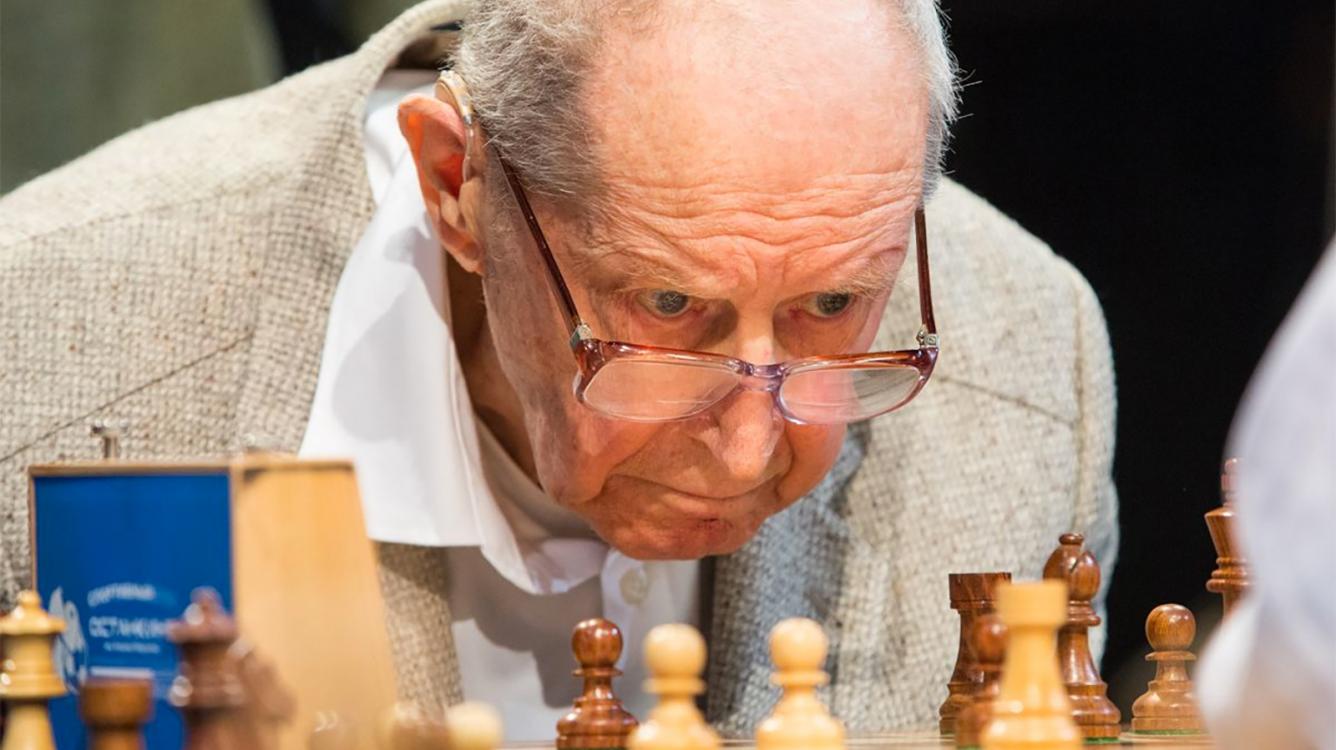
Yuri Averbakh, 1922-2022
GM Yuri Averbakh, the world’s oldest grandmaster, a trainer, international arbiter, chess composer, endgame theoretician, writer, historian, honorary member of FIDE, and the last living participant of the famous Zurich 1953 Candidates Tournament, has passed away, three months after turning 100. His death has been confirmed by the Russian Chess Federation and FIDE.
Averbakh was one of the few strong players who managed to simultaneously reach significant heights in chess theory, literature, journalism, history, and chess politics.
Of the numerous titles that Averbakh held, only the most prestigious is missing: world champion of chess. "I don’t have a champion character," he said. "I'm a researcher, not a fighter or a 'killer' behind the chessboard. I am interested in analyzing."

Averbakh: “The struggle of ideas has always been for me the most important moment in chess because it is in a creative debate that truth is born.” Photo: Russian Chess Federation.
Yuri Lvovich Averbakh was born on February 8, 1922, in Kaluga, a city 180 kilometers southwest of Moscow. His father, a German Jew—his ancestors were named Auerbach—worked as a forester in the Kaluga forests; he selected trees to be cut. His mother was a teacher of Russian language and literature as well as a typist.
In 1925 the family moved to Afanasyevsky Lane, near Arbat Square, in Moscow. Averbakh was fond of chess from the age of three and began playing the game when he was seven. In that year, his mother sent him to school.
This was a year earlier than most boys who started school then at eight. Averbakh always felt that this affected his entire subsequent destiny because in 1939, when the war started in Europe, all young men who had just finished school were sent into the army. However, Averbakh was too young to be a conscript and could continue studying at the Bauman Institute, which gave him a deferment from mobilization in 1941, when the Soviet Union entered the war.
"I was part of a tragic generation," Averbakh said about this. "Many friends died in the war, but I was lucky. Such a fate, I did not do anything for this—that's how life was." Historical records indicate that 93 percent of Russian males born in 1922 died at the front.
During his school years, Averbakh was fond of skiing, hockey, and volleyball but mostly boxing. But at some point, chess took over as his biggest interest.
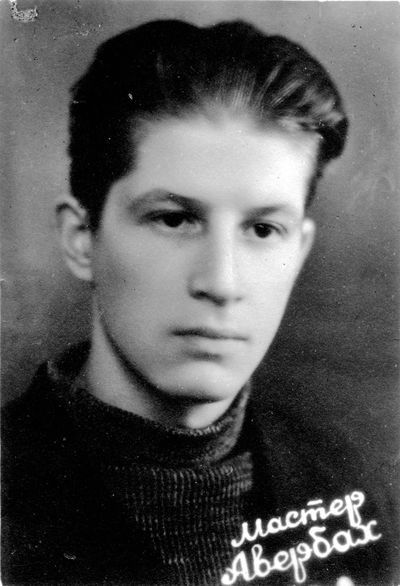
A young Averbakh. Photo: Russian Chess Federation.
During the war, Averbakh completed production instruction at a locomotive plant in Kolomna, and together with other students, he was sent to the armored base near Naro-Fominsk, where he was engaged in the repair of tanks and tractors. During 1941-1943 he studied in Izhevsk and returned to Moscow in April 1943.
"Not many players have had the privilege of living so long. A large part of my generation was lost in the war," Averbakh said near the end of his life. He often told the anecdote about being called to volunteer in October 1941.
An elderly officer saw his canvas shoes and asked: "Do you want to fight in such shoes? Quickly go to a store and find winter shoes!" By that time, Averbakh was already 1.90 meters (he was also a very decent volleyball player in his youth) and had a shoe size of 45. He couldn't find shoes anywhere. The next day many citizens started to flee Moscow and he joined. "I saved my fate," he said.
In those years he was spending a lot of time on chess as well with reasonable successes. In 1944 he was awarded the title of USSR Master of Sports.
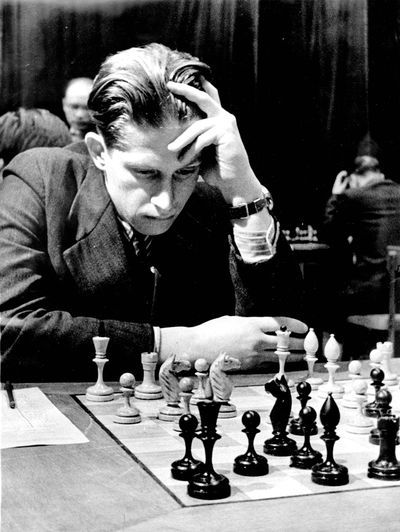
Averbakh at the board. Photo: Russian Chess Federation.
After graduation, Averbakh started working at the Research Institute for Missile Aviation, and worked there for five years, prepared a thesis, and even passed the candidate's minimum, but at some point decided to finally devote himself to chess.
Averbakh told the story that the head of his department once asked him how he was combining chess and science.
"I said: 'Frankly speaking, science hinders chess, and chess interferes with science.' He thought and said: 'I can let you go to play chess for two years. It if doesn’t work out, I'll take you back.' And when in 1954 I became the champion of the USSR and the contender for the world championship, the question was settled. In fact, he blessed me for a chess career."
In those early years, life wasn’t easy; Averbakh earned only about half of what he was making at the institute. Things got better when he became a grandmaster, in 1952. That was three years after his first major success, at the 1949 Moscow Championship, which he won ahead of players such as GM Andor Lilienthal, IM Yakov Estrin, and GM Vladimir Simagin. He would win the tournament also in 1950 and 1962.
Averbakh was the last living participant of the 1953 Candidates Tournament in Zurich, one of the strongest tournaments in history. Books by GMs David Bronstein and Miguel Najdorf about the event are considered among the best in chess literature.
Averbakh had qualified by finishing among the top eight players at the Saltsjobaden (Stockholm) 1952 Interzonal tournament, together with tournament winner GM Alexander Kotov, GM Mark Taimanov, GM Tigran Petrosian, GM Efim Geller, IM Gideon Stahlberg, GM Laszlo Szabo, and GM Svetozar Gligoric. They joined Bronstein, GM Isaac Boleslavsky, GM Vasily Smyslov, GM Paul Keres, GM Samuel Reshevsky, Najdorf, and GM Max Euwe.

Soviet participants Petrosian, Kotov, Keres, Averbakh, and Geller. Photo: Russian Chess Federation.
The tournament, a 15-player double round-robin with 28 rounds, was held from August 30 to October 23, 1953, and was won by Smyslov, who would challenge GM Mikhail Botvinnik for the world title the next year. Averbakh tied for 10th place with Boleslavsky, scoring 13.5/28.
1953 Zurich Candidates Tournament | Final Standings
| # | Name | 1 | 2 | 3 | 4 | 5 | 6 | 7 | 8 | 9 | 0 | 1 | 2 | 3 | 4 | 5 | Pts |
| 1 | Smyslov | ½½ | ½1 | 11 | ½½ | ½½ | 11 | ½0 | ½½ | ½½ | ½½ | ½½ | 1½ | 11 | 1½ | 18 | |
| 2 | Bronstein | ½½ | 11 | 1½ | ½½ | ½½ | ½0 | ½½ | 1½ | ½½ | ½½ | 01 | 1½ | ½½ | ½½ | 16 | |
| 3 | Reshevsky | ½0 | 00 | ½½ | ½½ | ½½ | ½½ | 10 | ½½ | ½1 | ½1 | 1½ | ½1 | 11 | 1½ | 16 | |
| 4 | Keres | 00 | 0½ | ½½ | ½1 | ½½ | ½1 | ½½ | ½½ | 0½ | 11 | 1½ | ½1 | ½½ | 11 | 16 | |
| 5 | Petrosian | ½½ | ½½ | ½½ | ½0 | 0½ | ½½ | ½½ | 00 | ½½ | ½½ | 11 | ½1 | 1½ | 11 | 15 | |
| 6 | Najdorf | ½½ | ½½ | ½½ | ½½ | 1½ | 00 | 1½ | 1½ | ½0 | ½½ | ½½ | ½½ | 0½ | 11 | 14½ | |
| 7 | Geller | 00 | ½1 | ½½ | ½0 | ½½ | 11 | ½0 | 01 | ½½ | 01 | 1½ | ½1 | 01 | ½½ | 14½ | |
| 8 | Kotov | ½1 | ½½ | 01 | ½½ | ½½ | 0½ | ½1 | 10 | 1½ | 00 | 10 | 1½ | 0½ | 01 | 14 | |
| 9 | Taimanov | ½½ | 0½ | ½½ | ½½ | 11 | 0½ | 10 | 01 | 10 | ½½ | ½½ | ½0 | 0½ | 11 | 14 | |
| 10 | Averbakh | ½½ | ½½ | ½0 | 1½ | ½½ | ½1 | ½½ | 0½ | 01 | ½½ | ½½ | 0½ | 11 | 00 | 13½ | |
| 11 | Boleslavsky | ½½ | ½½ | ½0 | 00 | ½½ | ½½ | 10 | 11 | ½½ | ½½ | ½0 | ½½ | ½1 | ½½ | 13½ | |
| 12 | Szabo | ½½ | 10 | 0½ | 0½ | 00 | ½½ | 0½ | 01 | ½½ | ½½ | ½1 | 1½ | ½½ | 1½ | 13 | |
| 13 | Gligoric | 0½ | 0½ | ½0 | ½0 | ½0 | ½½ | ½0 | 0½ | ½1 | 1½ | ½½ | 0½ | ½1 | 11 | 12½ | |
| 14 | Euwe | 00 | ½½ | 00 | ½½ | 0½ | 1½ | 10 | 1½ | 1½ | 00 | ½0 | ½½ | ½0 | 1½ | 11½ | |
| 15 | Stahlberg | 0½ | ½½ | 0½ | 00 | 00 | 00 | ½½ | 10 | 00 | 11 | ½½ | 0½ | 00 | 0½ | 8½ |
In this tournament, Averbakh played one of his most famous games—one that he lost.
One year after the Candidates, Averbakh scored his next major result, winning the Soviet Championship convincingly with 14.5/19, 1.5 points more than GMs Mark Taimanov and Viktor Korchnoi, with Petrosian, Geller, and GM Salo Flohr also in the field.
Averbakh was part of the USSR team that played the U.S. in a match in 1954 in New York. However, due to missing a game with IM Donald Byrne (caused by a broken clock in his room), he got into a quarrel with team captain GM Igor Bondarevsky and was removed from the team for a year for unsportsmanlike conduct even though he was the Soviet champion.
In 1955 with GM Boris Spassky, Averbakh joined the World Youth in Antwerp (thus avoiding activities in the army) because Spassky's regular trainer GM Alexander Tolush had broken his leg. Spassky won, and Averbakh was back on the national team.
It is just one example of a life mixed with success, luck, and tragedy. On the day he was offered a job in the chess federation, his mother had a stroke. When he became Soviet Champion, his father died.
By that time, Averbakh was already quite famous and was featured for 16 years on a TV program called "Chess School.” He was also a chess commentator during the Smyslov-Botvinnik 1954 world championship.
In the 1956 USSR Championship, Averbakh tied for first place with Spassky and Taimanov; the latter took the title after a playoff between the three.
A game from a secret training match with Botvinnik in 1957.
Thanks to his fourth place in the 1958 Soviet Championship, he qualified for the 1958 Interzonal tournament in Portoroz, where he came half a point short to qualify for the Candidates tournament. GMs Mikhail Tal, Gligoric, Petrosian, Pal Benko, Fridrik Olafsson, and Bobby Fischer qualified.
In his biography, Tal wrote a funny anecdote about a blitz game he played in 1959 in Bled. "I succeeded in winning it, but what sticks in my mind is something else: a unique oversight. I cannot recall the exact position, but the mechanism of the blunder was as follows:

"It was Black to move. Averbakh offered me a draw, but I decided to play on. So I saw that I had to defend against the threat of 2.Bxh7+ and 3.Qxd5. So I defended by 1…h6?? As you will have guessed, Averbakh replied 2.Bh7+, and didn’t offer a draw again."
Thanks to his good grasp of English, Averbakh got to travel all over the world, which was not the case for all Soviet GMs. He even went to South America, Asia, and Australia. In 1960 he won the Open Australian Championship and an international tournament in Jakarta.
Another big victory for Averbakh was the 1961 Schlechter Memorial in Vienna. The international field didn’t include other Soviet GMs, but his score of 9/11 was nonetheless impressive.
He won a tournament in Rio de Janeiro in 1965 and one in Christchurch, New Zealand, in 1967. He tied for first place with IM Artur Hennings in 1971 in Bucharest and also tied for first with GM Jan Plachetka at the 13th Rubinstein Memorial in 1975 in Polanica-Zdroj, Poland.
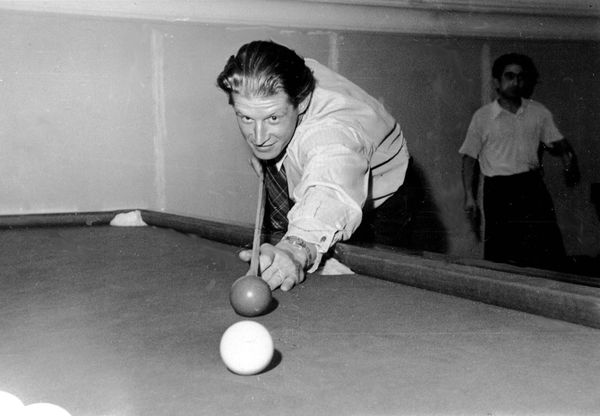
Averbakh playing billiards. Photo: Russian Chess Federation.
However, Averbakh wasn’t a chess professional after 1962. He quit chess rather early, at the age of 40. "I realized I wasn’t getting better, and I was fond of journalism and coaching," he said. "And I liked working with people—this quality I still had from my work at the institute."
During his life, Averbakh was involved in lots of journalistic activities. In 1958-62, he was the editor-in-chief of the magazine Chess Moscow, and in 1962 he became the editor-in-chief of two magazines: Chess Bulletin (published till 1991) and Chess in the USSR (published till 1991 under that name, as Chess Herald in 1992-95 and as Chess in Russia in 1995-99). It is said Fischer learned Russian to be able to read this magazine. From 1981 to 1991, Averbakh was also the deputy editor-in-chief of the encyclopaedic dictionary Chess.
In 2007, the Russian National Public Library for Science and Technology founded the Cabinet of Chess Culture and Information, which was later renamed simply Chess Center. At first, Averbakh was one of the leaders, but due to his age, he had to leave this post. He continued to be a scientific consultant for the center.
“We were looking to attract older people to the game. They should not play in tough tournaments but rather spend their time solving chess problems," he said. "Working with studies helps prevent Alzheimer's. If you are over 70, the stress of a tournament can be dangerous to your health. (…) But a calm and reflective attitude to chess is very useful, especially when you are very old. A healthy lifestyle with a lot of exercises is also important."
Until he was 87, Averbakh went swimming almost every day. He said that "working hard" was the secret to his longevity.
Averbakh showing studies in Moscow in July 2016.
Averbakh was a well-known theoretician, both in opening and endgame theory. As an opening specialist, he functioned as a second for Spassky, Tal, Botvinnik, Keres, Smyslov, and even Kasparov.
In the King’s Indian after 1.d4 Nf6 2.c4 g6 3.Nc3 Bg7 4.e4 d6, the moves 5.Be2 0-0 6.Bg5 are known as the Averbakh Variation. He used it, for instance, in his only encounter with Fischer at the 1958 Interzonal in Portoroz.
The game ended early and abruptly, with both players getting into time trouble.
"Suddenly Fischer offered a draw, which was completely against his nature," Averbakh said. "In an unclear position and having to reach move 40 before we would get more time, I agreed. After the game, I heard people ask Fischer why he proposed a draw. He said: 'Because I didn’t want to lose to a grandmaster.' When the same question was posed to me, I answered: 'Because I didn't want to lose to a boy!'”
Averbakh was also a major endgame study theorist. He published hundreds of studies; many have made notable contributions to endgame theory. He wrote a few dozen books, the most famous being his three-volume Chess Endings, which was translated into several languages.
The plan was to write it together with Bondarevsky and Keres, but the latter soon became a contender for the world championship, and Bondarevsky began to train Geller, then Smyslov and Spassky. Averbakh, with some helpers, managed to finish the book anyway, which was reissued 20 years later with two extra volumes.
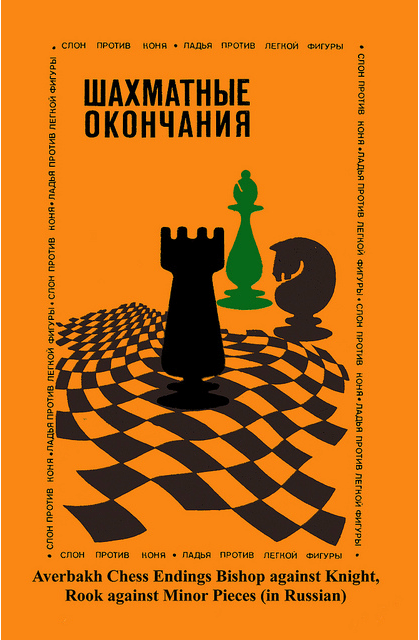
One of Averbakh's famous endgame books.
It is perhaps less known that Averbakh was also an active writer about the history of the game of chess. He was one of the few strong chess players who said something meaningful about the history of our game that is written in a clear and readable style. An example is his A History of Chess from Chaturanga to the Present Day, a book he considered his biggest achievement that was published in 2012 by Russell Enterprises.
Averbakh famously divided chess players into six groups, with examples of typical players:
- Punchers, who want to destroy their enemies: Botvinnik, Fischer, Korchnoi, Kasparov, Carlsen
- Fighters: Steinitz, Lasker, Bronstein, Morphy, Alekhine, Smyslov
- Grandmasters, for whom chess is a sport and who return to their ordinary lives when the game ends: Keres, Capablanca, Euwe
- People who are interested in everything, cards, dominoes, etc.: Karpov, Petrosian, Geller
- Artists: Tal, Capablanca, Simagin, Alekhine
- Researchers: Steinitz, Fine, Euwe, himself.
Averbakh's solid style was difficult for many pure attackers to overcome. An example is IM Rashid Nezhmetdinov, who Averbakh wrote, "if he had the attack, could kill anybody, including Tal. But my score against him was something like 8½–½ because I did not give him any possibility for an active game. In such cases, he would immediately start to spoil his position because he was looking for complications."
From 1962 to 1972, Averbakh was deputy chairman of the Soviet Chess Federation; from 1972 to 1977, chairman; and then many years again, deputy chairman. He was the chief arbiter of the first Karpov-Kasparov match in 1984, and also of Kasparov-Short, London, 1993, and Kasparov-Kramnik, London, 2000.
From 1978 to 1982 he was a member of the FIDE Executive Committee. From 1978 to 1986 he was a member of the FIDE Central Committee as well as simultaneously chairman of the Federation Qualification Commission and co-chairman of the Commission for Assistance to Developing Countries. From 1986 to 1991 he was chairman of the FIDE Committee for Propaganda and Press.
Averbakh played actively until he was 83. His wife passed away around the same time; they were together for 59 years.
In September 2017, at 96, Averbakh played what was probably his last published game against the then four-year-old Misha Osipov, an event that was also attended by Spassky and GM Sergey Karjakin.
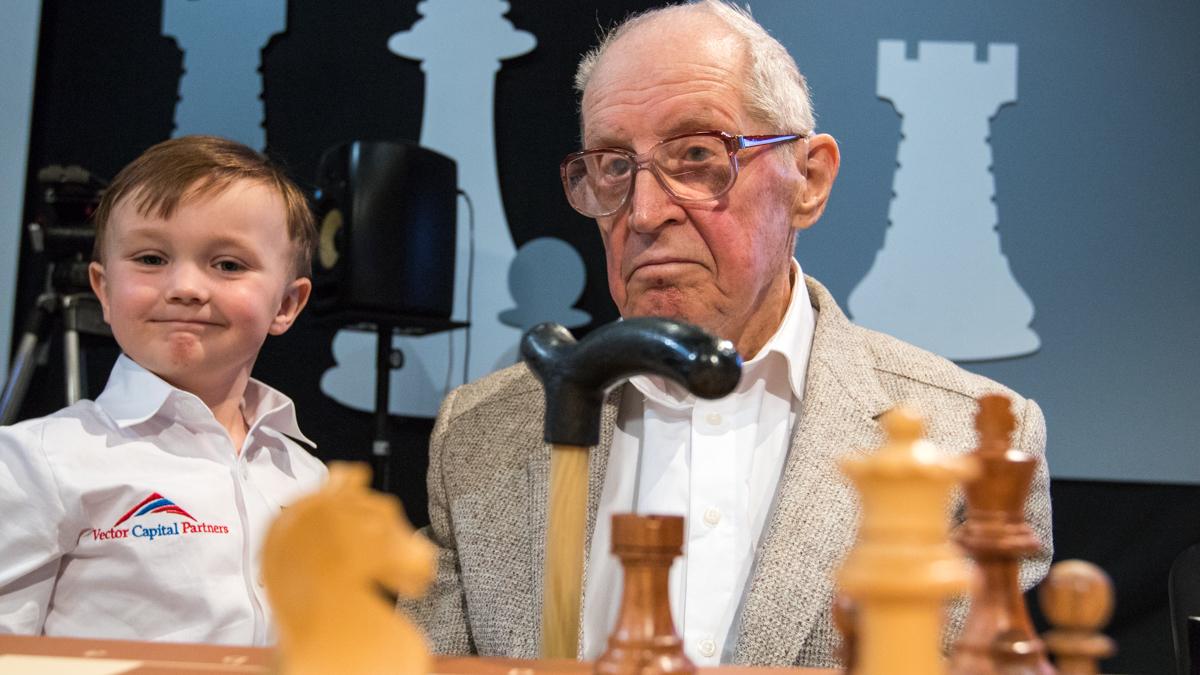
Averbakh with Osipov in September 2017. Photo: Maria Emelianova/Chess.com.
Last summer, Averbakh survived Covid-19, and only three months ago, on February 8, he turned 100 years old, as the first-ever grandmaster to become a centenarian. In an interview with Chess.com, he said that he was still involved in chess but only to a minor extent.
"Unfortunately, in recent years my eyesight and hearing have greatly diminished, so now I cannot work on the computer as before," he said. "Sometimes I meet with my colleagues and share with them the ideas that come into my mind. Sometimes I analyze endgame positions. I understand that in the computer age these analyses have no practical value, but this activity helps me to keep my mind sharp."
On May 4, three days before his death, Averbakh received the Order of Honor by decree of the President of the Russian Federation for "his great contribution to the development and popularization of the Russian and international chess movement and many years of conscientious work."
Averbakh is survived by a daughter, who was married to Taimanov for 10 years. The oldest living chess grandmaster now is GM Aleksandar Matanovic of Serbia, co-founder of Chess Informant.


